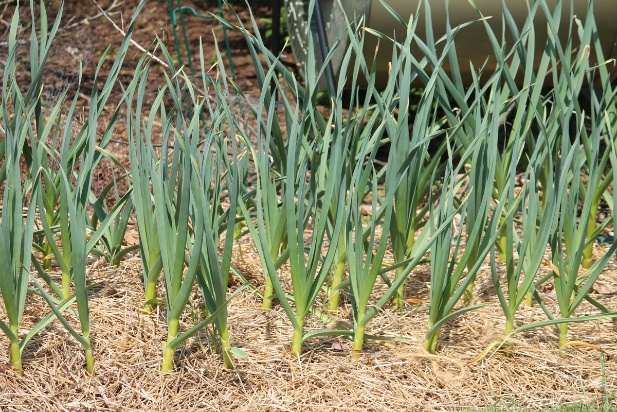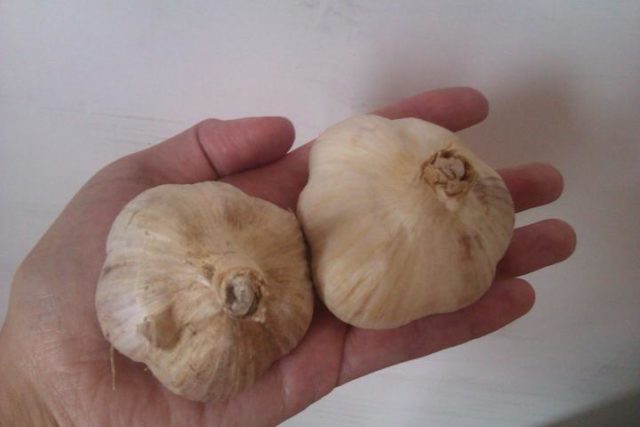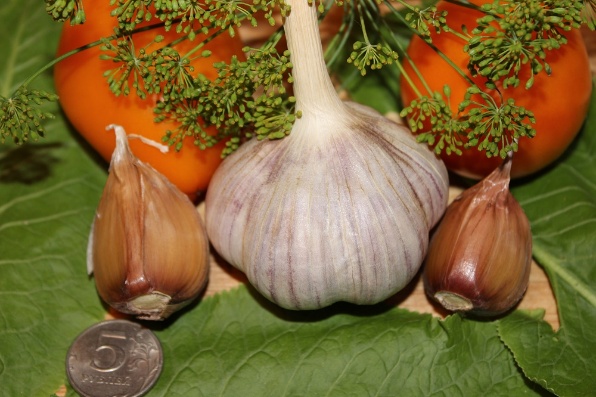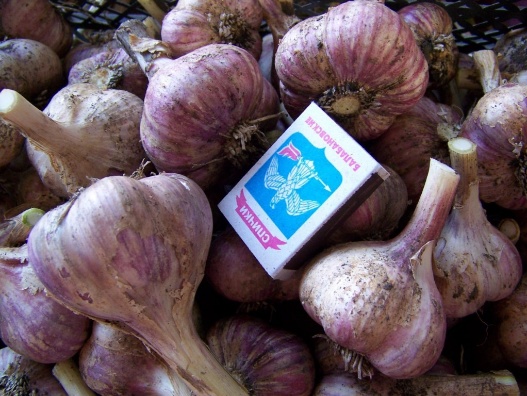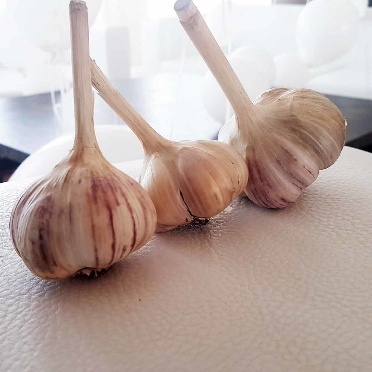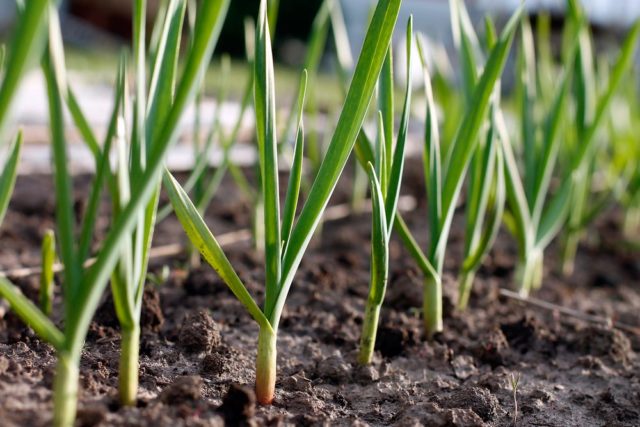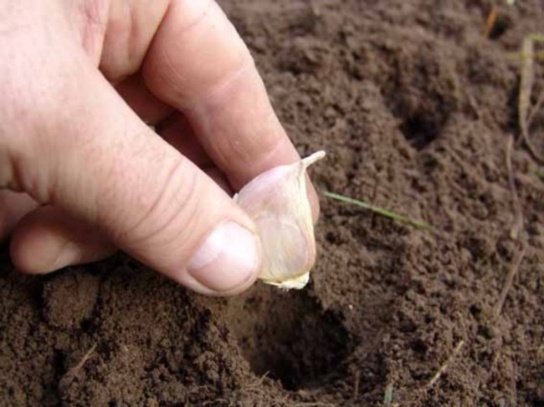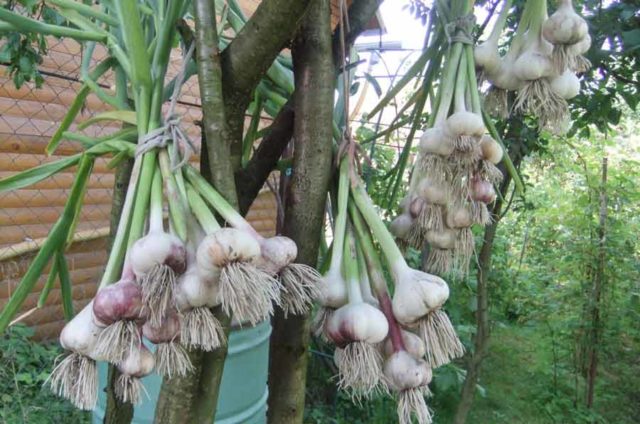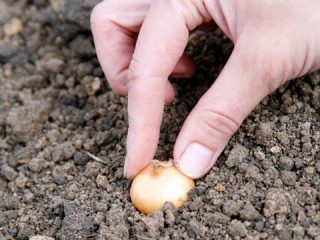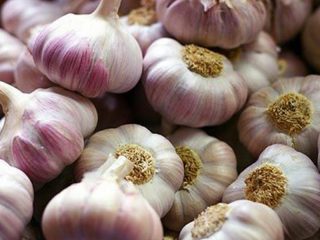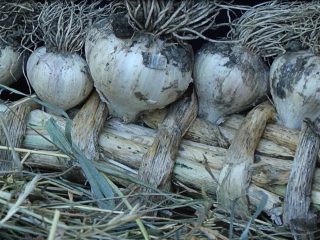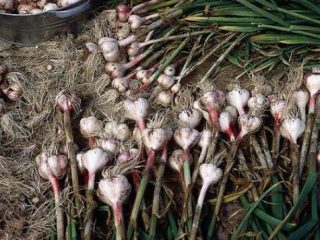Content
Garlic Bogatyr belongs to large-fruited varieties of domestic selection. The variety that recently appeared on the market attracted the attention of not only gardeners, but also housewives. This happened due to the unique properties of Bogatyr: his resistance to diseases and pests, as well as cold resistance.
Breeding history of the variety
The breeding history of the variety is not meant for the general public. The originator of OOO "Premium Seeds" prefers to keep secret both the history of selection and the parent varieties. Since the variety belongs to annuals, and the inflorescence is sterile, it can be assumed that this is a hybrid. How much the company cared about housewives who do not want to clean small slices is unknown. But the garlic heads turned out to be superbly large.
Description of garlic Bogatyr
In this case, the main product when growing a variety is its underground part, where large slices are formed. The ground part, even in green, is of lesser importance. It is more profitable to use other varieties for greens.
In the description of winter garlic Bogatyr, they especially emphasize the fact that it is unprofitable to plant it in spring. It is strictly a winter variety. Spring planting is carried out only to enlarge the cloves of garlic for the next year.
The length of the upper leaves of the Bogatyr variety is from 20 to 60 cm with a fairly decent average width of 1.5 cm. The growth of leaves begins from the outer ones. The sheet consists of 2 parts. The underside is white and protects against the clove of garlic. The upper part has a standard purpose: to help the plant accumulate nutrients.
After the outer leaves have sprouted, the rest begin to grow from the inside. This shape of the rosette provides mutual support to the leaves of the Bogatyr.
Ultimately, a false stem appears, in the middle of which an arrow grows. Because of this structure, the leaves of the Bogatyr garlic do not fall to the ground even at their maximum length. This description of Bogatyr garlic is confirmed by the photo below.
When the vegetable ripens, the leaves begin to turn yellow from below. After complete drying, when the tops turn white, the crop can be harvested.
The number of aerial leaves in Bogatyr garlic does not exceed 10 pieces. Lobules are usually up to 9. One leaf is "responsible" for the arrow.
The color of the casing layer of freshly dug garlic is bright purple. After drying, the protective layer turns light brown.
Characteristics of the Bogatyr garlic variety
The originator himself in the description indicates that the winter garlic Bogatyr is high-yielding. The data on the number of kilograms taken from a square meter does not indicate. It rests on a very large size of heads with an average weight of 80 g. The largest ones can weigh up to 115 g. With a maximum number of slices of 9, the weight of one is 13 g.
The firm that bred the variety also guarantees a high yield of the variety on any soil. The variety has one more feature, usually unusual for winter plants. According to consumer reviews, Bogatyr winter garlic has excellent keeping quality and can be stored for six months without losing its properties.
Yield
Since the manufacturer himself does not indicate the yield, you can try to calculate it based on the scheme for planting slices. Garlic Bogatyr has a powerful root system with a total area of 50 cm². It is recommended to plant it at a distance of 45 cm between rows and about 17 cm between slices. This means that 6-7 slices can be planted at a length of 1 m. You will get 2 rows in width. That is, a total of 14-16 slices per m². Each clove will produce a head of garlic with an average weight of 80 g. That is, the yield of the winter variety of Bogatyr garlic is about 1.2 kg / m².
Caring for Bogatyr is the same as for other varieties of garlic. From the advertisement from the originating company, it follows that the yield can only be affected by the “stuck and forgotten” situation without weeding from weeds and loosening the soil. Otherwise, the Bogatyr variety is very unpretentious.
The harvest time is determined by the state of the leaves. Garlic is not touched as long as it has green tops. After drying, the vegetable is dug up and dried a little before storing it.
Disease and pest resistance
Due to the fact that Bogatyr garlic is a winter variety, it manages to grow before pathogens multiply. Thus, the variety will bypass the vast majority of diseases.
Of the pests, the variety is resistant to the nematode. The rest of the insects are either frightened off by the smell of garlic itself, or the winter variety ripens before the pests appear.
Advantages and disadvantages of the variety
The advantages of the variety include its taste characteristics. The cloves have a strong garlic aroma and are pungent enough to add flavor to the dish. Good keeping quality is also one of the Bogatyr's advantages. The size of the lobules can be both a plus and a minus. In blanks with a large amount of garlic, it is better to use large and easily cleaned slices of Bogatyr.
But fresh garlic of this size cannot be consumed at a time. And in this case, dignity turns into a disadvantage. If you need slices of different sizes, the Cavalier garlic variety is more suitable.
Comparison of the characteristics of winter garlic Cavalier and Bogatyr
Both varieties are very similar at first glance:
- winter crops;
- arrows;
- large heads with an average weight of 80 g;
- winter hardy;
- give good yields on all types of soil;
- do not lose taste and smell during long-term storage.
But there are also differences between the varieties. There are no more than 9 large teeth in Bogatyr's head, usually 7. A cavalier can give up to 16 lobules, usually 8-12. Cavalier's teeth are large, but have different sizes: some are larger, others are smaller.
The protective scales of the Bogatyr are light brown when dry, and for the Cavalier they are white. Fresh, the Bogatyr's protection is violet, the Cavalier's is white with a slight purple tint. The planting depth of the cloves also differs.
Planting and caring for garlic
The specificity of winter varieties of garlic involves planting prongs in the fall after the summer harvest. The place for planting is chosen so that in the spring it would be well warmed up by the sun. In the fall, this should be a dry enough area so that the cloves do not rot until spring. Garlic grows well after 4 garden crops:
- cucumbers;
- carrots;
- zucchini;
- potatoes.
The Bogatyr variety can be planted in the fall, but in this case, a single-toothed head will turn out. This is a little agrotechnical trick. The yield with single-toothed heads is low, but next year, with a winter planting, a larger garlic will turn out from such a "prong". Experienced gardeners use this technique, wanting to enlarge the slices.
Planting dates for garlic
Planting times for winter crops in different regions differ from each other. Bogatyr should be planted 1-1.5 months before frost. In the northern regions, this is usually mid-October. In the southern regions, you can plant in December. Especially considering that in December in the south, trees often even begin to bloom. Planting a winter variety there in the middle of autumn means destroying young shoots. Therefore, when landing, they are guided by the annual weather forecast.
Garden bed preparation
Garlic is an unpretentious plant and does not need special preparation of the beds. When planting in autumn, no fertilizer is added. They will be required in the spring. If the soil is fertile, you can do without top dressing at all.
The selected area is cleaned of the remnants of summer crops and dug to the depth of the shovel bayonet. Clods of earth are crushed with a rake. On the finished site, grooves with a depth of 13 cm are laid at a distance of 45 cm from each other.
This method eliminates the need to manually make grooves and allows you to evenly place the teeth.
Planting garlic
There are 2 planting methods: in the hole and in the groove. When planting in a groove, the cloves are placed on the ground and sprinkled with loose earth on top. In this case, the heads are larger.
Garlic Bogatyr is planted in rows at a distance of 45 cm from each other. A space of 16-18 cm is left between the teeth. A prerequisite for the Bogatyr is that the bottom of the clove should be at a depth of 13 cm.
For the Cavalier, a depth of 6-7 cm is required.
Growing garlic
With the onset of frost, the beds with winter garlic are mulched and left until spring. All procedures for hilling, loosening, removing weeds, etc., begin only in the spring.
Garlic is one of the few crops that is insensitive to weeds. But even it is necessary to weed. It is better to remove weeds from garlic beds by cutting the aboveground part so as not to damage the garlic root system.
Loosening and watering is carried out as needed. It is necessary to loosen the soil carefully and shallowly so as not to damage the heads.
Harvesting and storage
After the tops have dried, the garlic is dug up. The root system is still "alive" at this time. Because of the powerful roots, Bogatyr's garlic must be pruned from below, otherwise there is a great chance of damaging the garlic teeth.
The tops are not cut off when harvesting. The roots of the dug out plants are cut shortly. Garlic is tied in bunches by the tops and hung in the shade in the air to dry. After the heads dry, the tops can be cut off and the garlic stored in a cool place.
Garlic propagation methods
Since the inflorescences of the Bogatyr variety are sterile, it can only be propagated by planting slices. Bogatyr does not have additional small "bulbs" that would allow him to grow garlic without harming the household. For divorce, you need to leave selected heads with large lobules. But the possibility of vegetative propagation of a hybrid can be considered good luck, since usually such plants cannot be bred on their own. The need to plant Bogatyr every year is a minor inconvenience compared to the result obtained.
Diseases and pests, methods of control and prevention
The Bogatyr variety is considered disease resistant. This is achieved through winter plantings, when fungal diseases have not yet had time to develop. Bottom rot occurs only at high temperatures and high humidity. But the Bogatyr can also get sick.
When ripe, the tops turn yellow at the bottom. If the leaves begin to turn yellow at the ends, then the garlic lacks potassium and nitrogen. This usually occurs in the southern regions.
Late planted garlic can be damaged by insects that appear in late May or June. But winter varieties have time to grow before the mass summer of pests.
Disease and pest control measures are standard for all garden crops:
- crop rotation;
- cleaning of dead plant parts;
- digging up the soil for the winter, in this case in parallel with planting the cloves;
- disinfection of planting material.
Against infections in the spring, you can water the garlic with a solution of potassium permanganate. At the same time, potassium fertilization is carried out.
Conclusion
Garlic Bogatyr is well suited for autumn home preparations and, especially, for making adjika. Disease resistance and winter planting of the variety allows you to get good yields.
Testimonials

